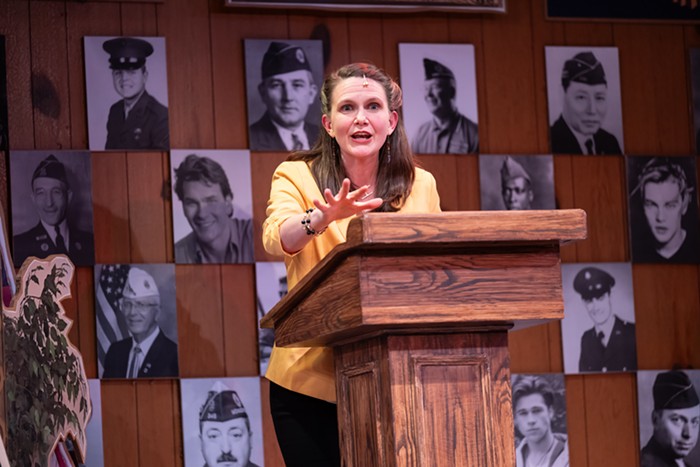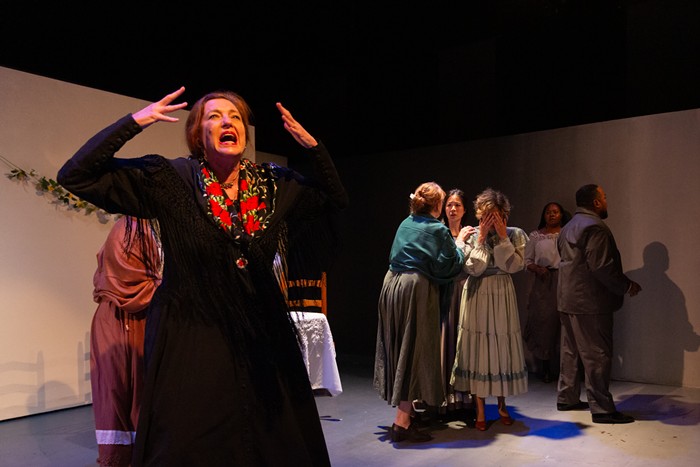"I'M NOT INTERESTED in a revival," says Kathleen Hanna. "I'm not interested in 'Riot Grrrl Part Deux.'"
It's one of the first things she says when we talk on the phone ahead of her appearance in Portland, and it sounds like she's had to say it a lot recently. Thanks to mounting nostalgia for the '90s, she's started getting letters from teenagers that say things like, "'I wish I lived in the '90s... I wanna revive riot grrrl,'" she says. "And it's like, please don't. Start your own thing, start something that speaks to your generation, start something smarter and better."
Hanna's been positioned—often reluctantly—as a figurehead of the feminist punk and art movement since she was lead singer of Bikini Kill. Twenty-five years later, Hanna's writing and performing with her newest band, the Julie Ruin, with visual art projects in the works (she's a fan of installation artist Yayoi Kusama). When she says she doesn't want a riot grrrl mulligan, it doesn't come off as nihilistic or demurring, but deeply practical, at least if you care more about lasting social change than vintage baby barrettes. "I guess that's a kind of horrible message," she admits, laughing. "I'm like, 'Don't do it!' But... look at what punk rock feminism brought to the table and find the stuff that you can take into the future that's great, and throw the stuff that was stupid away."
Hanna's comments about nostalgia for the movement hit close to home. I've noticed it among millennial women in particular: We feel like we missed out on something, and retroactive FOMO may be the worst kind, because it's impossible to kill. But when I ask her point-blank if she thinks we missed out, Hanna says that's the wrong way to think about it.
"Yeah, I don't think you did," she says. "I think that you guys were given a really interesting legacy to look at and explore and make something out of. And the thing that's exciting about people saying, 'Oh, we missed out' is that they're interested in feminist activity.... And if it's nostalgia for something that you didn't get that leads you there, I don't care."
What Hanna doesn't want to see is riot grrrl uncritically replicated, and she's uncomfortable with the impulse to romanticize a movement that wasn't as intersectional as it could have been—and was often challenging to be part of. "[Bikini Kill was] very vilified during the '90s by so many people, and hated by so many people, and I think that that's been kind of written out of the history," she says. "People were throwing chains at our heads—people hated us—and it was really, really hard to be in that band.... It's sometimes hard for me when people are like, 'Oh, I wish I was in a girl band in the '90s,' and I'm like, 'No, no, you don't.'"
Hanna's frustration over a revisionist history is understandable, and it isn't surprising. She's always had a somewhat fraught relationship with her own hagiography, and with '90s nostalgia, it's back with a vengeance, her name cropping up repeatedly in books like Sara Marcus' Girls to the Front; when we talk about The Punk Singer, the documentary made about her in 2013, she's emphatic in pointing out what it omits (that she's "a bit of a jerk"). Other artists might be comfortable with mythologizing, but it says a lot about riot grrrl that Hanna is so invested, 25 years on, in making sure that we get closer to the truth. After all, it marked a moment in time when, faced with an often dangerous, male-dominated punk scene, young women began to speak up—at the highest possible volume—about their experiences with sexism in underground music (sometimes, you have to be a jerk). That urge to be loud about injustice is one of riot grrrl's greatest legacies. And it doesn't need to be revived, because it hasn't gone anywhere.



















